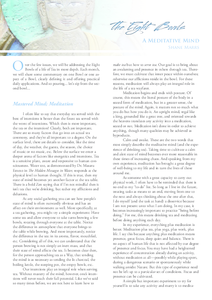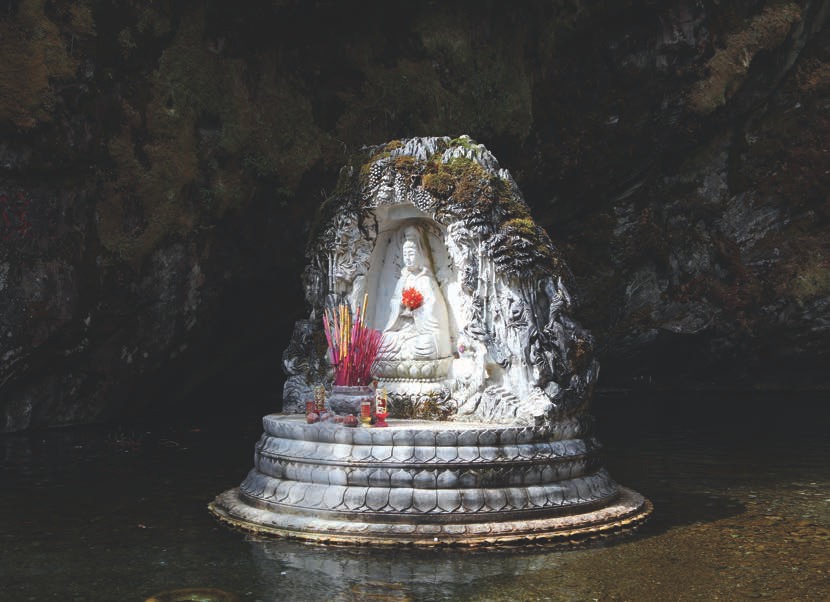
 |
|

Over the few issues, we will be addressing the Eight Bowls of a life of Tea in more depth. Each month, we will share some commentary on one Bowl or one aspect of a Bowl, clearly defining it and offering practical daily applications. And so pouring... let's sip from the second bowl...
At any social gathering you can see how people's state of mind is often outwardly obvious and has an affect on their environment as well. More specifically, at a tea gathering, you might try a simple experiment: Have some tea and allow everyone to take turns brewing a few bowls, rotating through everyone at the table. Notice the difference in atmosphere that everyone brings to the table while brewing. And more importantly, notice the difference in the tea: in its aroma, flavor, mouthfeel, etc. Considering all of this, we can understand that the person brewing is not simply an inert mass, and that their state of mind affects the tea. It becomes clear then, for the person approaching tea as a Way, that tending the mind is as necessary as tending the lit charcoal, the boiling kettle, the steeping pot, the empty bowls, etc.
Our intentions play an integral role when serving tea. Without mastery of the mind, however, one's intentions will never reach their full potential. Like we've said so many times before, we are not here to learn how to make tea but how to serve tea. Our goal is to bring about an awakening and presence in others through tea. Therefore, we must cultivate that inner peace within ourselves; otherwise our afflictions reside in the bowl. For these reasons, meditation will always play an integral role in the life of a tea wayfarer.
Meditation begins and ends with posture. Of course, this means the literal posture of the body in a seated form of meditation, but in a greater sense, the posture of the mind. Again, it matters not so much what you do but how you do it. An upright mind, regal like a king, grounded like a great tree, and oriented towards the heavens translates any activity into a meditation, seated or not. Meditation isn't done in order to achieve anything, though many qualities may be achieved as byproducts.
Calm and awake. These are the two words that most simply describe the meditative mind (and the experience of drinking tea). Taking time to cultivate a calm and alert state of mind becomes ever more reasonable in these times of increasing chaos. And speaking from my own experience, meditation has brought a great degree of well-being to my life and in turn the lives of those around me.
As someone with a great capacity to carry out physical work, I often have to be reminded that there is no end to my "to-do" list. So long as I live in the future, treating tasks as means to an end, moving from one to the next and always thinking about the one after that, I do myself (and the task at hand) a disservice because I am not present unto what I am doing. In my case, it becomes increasingly important to practice "being before doing." For me, this means drinking tea and meditating before doing anything each day.
In my experience, everything plus meditation is better. Meditation plus tea, plus yoga, plus work, plus life. I say this because anything plus meditation means presence, great focus, deep quiet and balance. There is no aspect of human life that is not affected by our degree of presence and focus. You may have had a heightened experience of concentration already during an activity, without meditation at all - possibly while playing sport, during a dangerous scenario or spontaneously while walking amidst Nature. But this type of experience need not be left up to a particular set of conditions. Focus and presence can be cultivated.

A simple but important experiment to try for yourself is to take any activity and marry it to meditation for one week. Then, for the following week, remove meditation from the equation. Whether that activity is yoga, fixing cars, reading the morning paper, or drinking tea, try meditating before the activity for the first week. During the second week, carry out the activity as you normally would, without any meditation. Ask yourself what the difference was. Try not to brush this off as a rhetorical experiment. Generate your own experiential understanding of the influence meditation can have in your life. Give it a fair trial and then make a decision from your own personal experience.
One of the most poignant aspects of tea is the emptiness that allows everything to connect: the empty space of the tea room which allows us to be; the brazier which holds the charcoal; the kettle which holds the water; the tea pot which holds the tea leaves and water; and the bowl which holds space for the liquor... Everything is holding space and serving a function to promote connection through tea. As noted before, since the brewer is just as much a part of the process as any of the other tea elements, so too must we empty ourselves. Just as any impurities in the teapot would be evident in the cup, so too are the impurities of our mind steeped into the liquor. For the Chajin, person of tea, therefore, cultivation of mindfulness through meditation will be a necessary framework for each and every day. If I am to serve tea in a way that inspires calm wakefulness in others, then it must come from a place of calm wakefulness within myself. Like this, all great tea comes out of the meditative mind.

One of the most poignant aspects of tea is the emptiness that allows everything to connect...